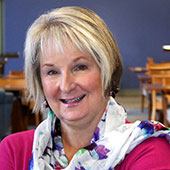M.J. Tooey, executive director
What a slow/fast and strange year this has been – and now 2020 is drawing to a close. Many days remind me of the movie Groundhog Day. And who isn’t fatigued? COVID-19 fatigue. Zoom fatigue. Resilience fatigue. Juggling multiple priorities fatigue. And as we speed past Thanksgiving and toward the year’s end, the normal progression of days off and holiday celebrations seem almost meaningless. Isn’t all that depressing? Maybe, but there will be an “after” and things will get better.
I recently read an article that used three words to describe what needs to happen when we get past this time. I am taking them to heart as the HS/HSL moves forward. These three words are Restore, Evolve, Transform.
Restore – We are looking closely at everything we learned during our time away. The concept of the Library has to change. The Library is more than a building. From March 14 until September 14, when the building reopened on a limited basis, the library team was extremely effective, pivoting in response to circumstances. While remaining “the Library” with outstanding service and not missing a beat beyond access to physical collections and the building. What did we learn from all this? What do we need to restore? And what should we leave behind?
Evolve – We are not waiting until the “new normal” to figure out how we need to evolve and reinvent ourselves as knowledge infrastructure support for UMB. But not just support – integration! We have already begun conceiving and implementing new and exciting initiatives, such as offering data visualization and storage through our Center for Data and Bioinformation (see article below) and collaborating with the Institute for Clinical and Translational Science and other new partners. And if COVID-19 has taught us nothing else – we are increasing our efforts to develop health literate faculty, staff, students, and communities beyond.
Transform – What does it mean to be “a library”? Transformation is the toughest concept, but we are committed to evolving as an institution. We will look beyond the library literature and become knowledgeable about trends in information, knowledge, and data management in order to fully advance UMB’s mission and plans, integrating our expertise whenever and wherever we can. And our building? When it was conceived and designed almost 30 years ago, our vision was a building that was a community, gathering, and collaboration space. What does that mean? Transformation continues by welcoming new tenants, colleagues. and partners. Twenty years ago, a library leader advised libraries to stay in their lanes. While we are staying in our lanes, we are surely widening them!
The HS/HSL team misses all of you. We have made new virtual friends and learned we are stronger and more creative than we thought possible. We are online waiting for you! We miss our physical space and the energy of collaboration, studying, and serendipitous interactions we would see daily. Our wish for all of you is a relaxing time away, and a chance to contemplate renewal in 2021.











